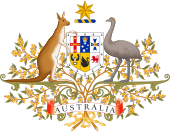Foreign Influence Transparency Scheme Act 2018
| Foreign Influence Transparency Scheme Act 2018 | |
|---|---|
 | |
| Parliament of Australia | |
Long title
| |
| Enacted by | Parliament of Australia |
| Enacted | 28 June 2018[1] |
| Considered by | Australian Senate |
| Assented to | 29 June 2018[1] |
| Legislative history | |
| Introduced by | Malcolm Turnbull |
| First reading | 7 December 2017[1] |
| Second reading | 26 June 2018[1] |
| Third reading | 26 June 2018[1] |
| First reading | 27 June 2018[1] |
| Second reading | 27 June 2018[1] |
| Third reading | 28 June 2018[1] |
| Status: In force | |
The Foreign Influence Transparency Scheme Act 2018 (Cth) (FITSA) is an Australian statute that creates a registration scheme for foreign agents in Australia.
FITSA is modelled on the American Foreign Agents Registration Act; when he introduced the bill that would become FITSA in Parliament, then–Prime Minister Malcolm Turnbull described it as an "improved version" of the American statute.[2] The statute was part of a "package" of legislation aimed at countering foreign influence in Australia that the Turnbull government advanced beginning in December 2017.[3][4] When drafting the bill, the Turnbull government worked closely with the United States Department of Justice.[5] It was amended substantially following criticism from civil society groups that argued the original provisions would stifle freedom of speech.[6]
FITSA received royal assent on 29 June 2018.[7] It requires anyone who engages in lobbying or "any kind of communications activity for the purpose of political influence" on behalf of a "foreign principal"—a term that includes foreign governments and some other organizations—to register with the federal government, and imposes criminal penalties for failure to do so.[3]
Notes[]
- ^ a b c d e f g h "Foreign Influence Transparency Scheme Bill 2018". Parliament of Australia. Retrieved 9 August 2021.
{{cite web}}: CS1 maint: url-status (link) - ^ Draffen & Ng 2020, pp. 1102–1103.
- ^ a b Douek, Evelyn (11 July 2018). "What's in Australia's New Laws on Foreign Interference in Domestic Politics". Lawfare. Archived from the original on 17 June 2021. Retrieved 9 August 2021.
- ^ Köllner, Patrick (4 May 2021). "Australia and New Zealand recalibrate their China policies: convergence and divergence". The Pacific Review. 34 (3): 405–436. doi:10.1080/09512748.2019.1683598. ISSN 0951-2748. S2CID 211459742. Archived from the original on 22 February 2020. Retrieved 9 August 2021.
- ^ Robinson 2020, p. 1089.
- ^ Robinson 2020, pp. 1089–1090.
- ^ "Foreign Influence Transparency Scheme Act 2018". Archived from the original on 15 May 2021. Retrieved 9 August 2021.
Sources[]
- Draffen, Chris; Ng, Yee-Fui (2020). "Foreign Agent Registration Schemes in Australia and the United States: The Scope, Risk and Limitations of Transparency" (PDF). University of New South Wales Law Journal. 43 (4): 1101–1136.
- Robinson, Nick (2020). "'Foreign Agents' in an Interconnected World: FARA and the Weaponization of Transparency". Duke Law Journal. 69: 1075–1147.
Further reading[]
- Barker, Cat; McKeown, Deirdre; Murphy, Jaan (16 March 2018). "Foreign Influence Transparency Scheme Bill 2017 and Foreign Influence Transparency Scheme (Charges Imposition) Bill 2017". Parliament of Australia.
External links[]
- 2018 in Australian law
- Acts of the Parliament of Australia
- Foreign relations of Australia
- Foreign intervention
- Australian law stubs